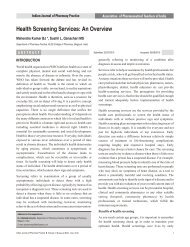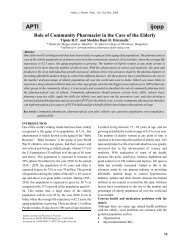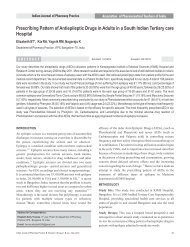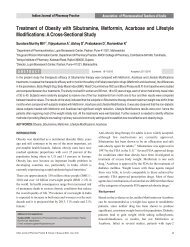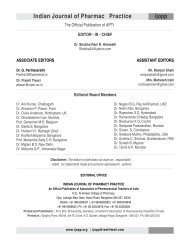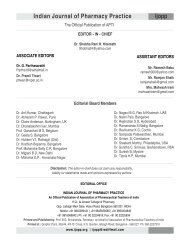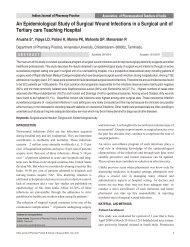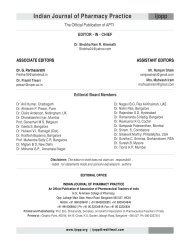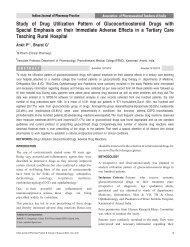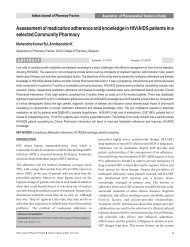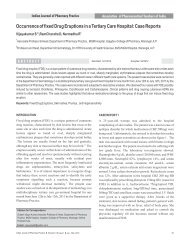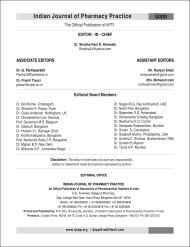APTI ijopp - Indian Journal of Pharmacy Practice
APTI ijopp - Indian Journal of Pharmacy Practice
APTI ijopp - Indian Journal of Pharmacy Practice
- No tags were found...
You also want an ePaper? Increase the reach of your titles
YUMPU automatically turns print PDFs into web optimized ePapers that Google loves.
<strong>Indian</strong> J. Pharm. Pract. 1(2), Jan-Mar, 2009training and skills developed in practice should be widely13Table 1. Perhaps the most noteworthy aspect <strong>of</strong> thisunderstood.comparison is that, although the data have been drawnMore than 30 years ago, it was already clear that the basis from a range <strong>of</strong> disparate sources such as North America,for pharmacy specialisation is related to a specialised Western Europe, Asia and Australia, there are severalknowledge <strong>of</strong> pharmacy-related sciences (biological and common themes that emerge. Importantly, each study10behavioural), rather than a particular practice setting. validates the early findings from the work initiated by thePharmacists practising in specialised roles have the WHO, confirming the high prevalence <strong>of</strong> mental illnessopportunity to provide a highly refined and effective type in various settings and providing a basis for a conclusion<strong>of</strong> pharmaceutical care in a context where a generalist that this area has justifiably been selected by healthpractitioner may not have the opportunity to do so, policy makers as a high priority for the development <strong>of</strong>providing a unique avenue to a high quality and strategies that might be used to reduce the associateddistinctive contribution to the advancement <strong>of</strong> quality harm.use <strong>of</strong> medicines for highly vulnerable patients. A range It is clear that mental illnesses are very common. Those<strong>of</strong> pharmaceutical specialities have now been who are affected, experience significant disadvantagesacknowledged and are flourishing, including highly that are evident in terms <strong>of</strong> poorer health outcomes,focused areas such as oncology pharmacy, higher rates <strong>of</strong> premature death and enduring disability,radiopharmacy and psychiatric pharmacy. The role <strong>of</strong> socioeconomic disadvantage and poor quality <strong>of</strong> life.psychiatric pharmacists in patient care has been People with mental illness are significant users <strong>of</strong> health11extensively advocated, and this type <strong>of</strong> practice model services, having frequent and lengthy hospitalisationshas been shown to improve clinical outcomes and reduce and requiring extensive medication therapy.psychotropic medication-related morbidity. 12 Polypharmacy is common amongst those withRationale for clinical pharmacy in psychiatrypsychiatric illnesses, and the drugs that are used are <strong>of</strong>tenExtensive previous research has addressed the <strong>of</strong> low therapeutic index and with considerable potentialprevalence <strong>of</strong> MRPs in hospitals and the community, and to cause significant medication-related problems.the utility <strong>of</strong> clinical pharmacy services as a means to Fundamentally, it is also clear that pharmacists, by naturemitigate medication-related harm: a detailed discussion <strong>of</strong> their training, experience and skills developed through<strong>of</strong> this research is beyond the scope <strong>of</strong> discussion here. ongoing clinical practice, bring a unique perspective toThe potential impact <strong>of</strong> the implementation <strong>of</strong> specialist the care <strong>of</strong> patients with mental illnesses, in this wayclinical pharmacy services would be expected to be enhancing health outcomes through the prevention,influenced not only by the utility <strong>of</strong> the service delivery detection and resolution <strong>of</strong> medication-related problems.model, but also the prevalence <strong>of</strong> mental illnesses and the The integration <strong>of</strong> specialist pharmacists into adisability associated with them. With respect to quality multidisciplinary team caring for patients with complexuse <strong>of</strong> medicines initiatives in a public health sense, psychotropic pharmacotherapy needs allows thepriority must be given to areas in which adverse health application <strong>of</strong> the unique skills and experience <strong>of</strong> theseoutcomes and medication-related harm have the greatest practitioners in situations where that positive impact <strong>of</strong>potential to cause death, disability, compromised quality the services can be expected to be highest. It is desirable<strong>of</strong> life and adverse societal consequences, including for pharmacists to have distinctive role inincreased treatment costs, increased health service multidisciplinary mental health treatment teams,utilisation and other unfavourable economic outcomes working in cooperation with consumers and clinicians assuch as loss <strong>of</strong> productivity.brokers <strong>of</strong> specialised knowledge in clinical pharmacyThere has been a rapid growth in information about theand therapeutics, and integrating this with insight intoepidemiology, severity, and social and economic influpathophysiologyand an understanding <strong>of</strong> life challengesences <strong>of</strong> mental disorders around the world. The faced by patients with severe and chronic psychiatriccompelling and consistent nature <strong>of</strong> the information that illnesses.is available to guide policy and to influence directions in Evidence for the benefits <strong>of</strong> clinical pharmacy inhealth service delivery demands that the detection, psychiatryprevention, early management and follow-up <strong>of</strong> mental Research into the use <strong>of</strong> psychotropic drugs hasdisorders rate as concerns that equal other major health identified important roles for clinical pharmacists in thepriorities. Key research in this area has summarised in14management <strong>of</strong> psychiatric illness. Polypharmacy is2



